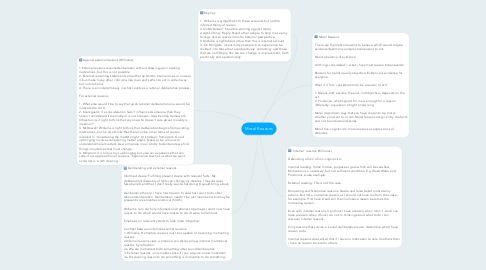Moral Reasons
by Anna Bromely

1. Deliberating and external reasons Informed desire: Fulfilling present desire with relevant facts. My deliberation/discovery of facts can change my desires. I may discover false beliefs and that I don't really want what doing X would bring about. Deliberative theory: I have most reason to do what I want to do after rational deliberation. Deliberation needn't be just means-end but may be pleasant/convenient/economical (Smith) Williams: I am not fully informed and rational so perhaps I don't now have reason to do what I would have reason to do if I were full rational Emphasis on rationality starts to look more 'objective'. Contrast between internal/external reasons: 1. Williams, Normative reasons must be capable of becoming motivating reasons. 2.Internal reasons view - someone can discover new internal (normative) reasons by reflection. 2a. We are motivated to do something after sound deliberation 3. External reasons - only makes sense if i can acquire a new motivation 3a. Discovering reason to do something is motivation to do something.
2. Against external reasons (Williams) 1.External reasons require deliberation without drawing upon existing motivations, but this is not possible 2. External reasoning statements are either optimistic internal ones or unclear 3.Can make many other criticisms like cruel and selfish to act in certain way but not irrational 4. There is an indeterminacy in what counts as a rational deliberative process. For external reasons 1. What else would it be to say that upon rational deliberation one would be motivated to do X. 2. Koorsgaard: if a consideration hasn't influenced someone then they haven't considered it rationally or is not a reason. Uses Kantian framework. Objection: Is it right to think that anyone who doesn't care about morality is irrational? 3. McDowell: Williams is right to think that deliberation begins from existing motivations, but he also thinks that there can be other forms of reason involved in 'considering the matter aright'. Aristotilean framework. Good upbringing involves considering matter aright. Need to be virtuous to understand moral matters. As we improve in our ability to deliberate we find things in ourselves that must change. 4. Millgram: It is not just our upbringing but also our experience that can correct our appreciation of reasons. 'Experience teaches us what we want' and what is 'worth desiring'.
3. Replies 1. Williams is sympathetic to these accounts but not the inferred theory of reason. 2.On McDowell: 'Sensible warning against moral weight-lifting'. Reply: Need other people to help me see my failings and so leaves room for external perspective. If Aristotle is right about virtue then this is internal account. 3. On Millgram: insensitivity example. Can experience be divided into those that are objectively 'correcting' and those that are not? Reply: Yes we can, change is improvement, both practically and epistemically.
4. Moral Reasons There are theoretical reasons to believe which would require evidence/testimony and practical reasons to act. Need a balance of evidence. All things considered = what i have most reason to believe/do Reasons for belief usually objective. Evidence is evidence for everyone. What is it for a consideration to be a reason to act? 1. Means-end: assume the end, not objective, depends on the act. 2. Prudence: what is good for me is enough for a reason 3.Morality: a question of right and wrong Moral cognitivism says that you have reason to be moral whether you want to or not. Moral reasons are given by the facts and not be individual desires. Moral non-cognitivism: moral reasons as expressions of attitudes.
5. 'Internal' reasons (Williams) Defending a form of non-cognitivism Internal reading: Some motive, purpose or goal which will be satisfied. Motivation is a necessary, but not sufficient condition. E.g Glass/Water and Poisonous snake example. External reading: This is not the case. Motivating and Normative reasons: Desire and false belief motivate my actions. But not a normative reason, as I should not have ran from the snake, for example. If I'd have stood still then normative reason becomes the motivating reason. Even with internal reasons I can think I have a reason when I don't. And I can have a reason when I think I do not. In thinking about what to do I can discover internal reasons. Only reasons that survive a 'sound deliberative route' determine what I have reason to do. Internal reasons does entail that if i have no motivation to care for others then i have no reason to care for others


